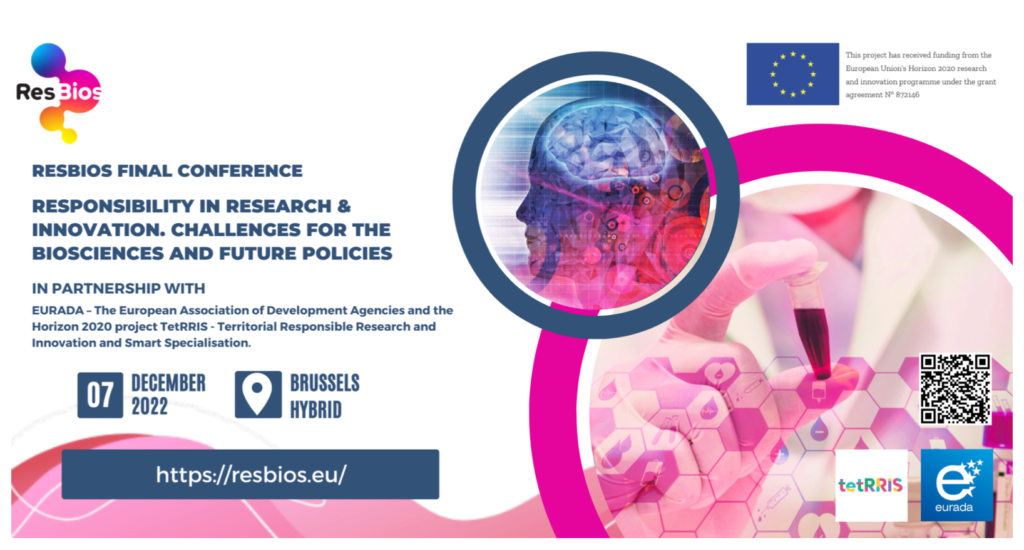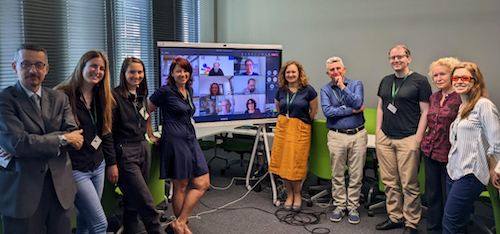December 7, 2022, Rue Montoyer, 24 – 1000 Brussels (hybrid event)

At the inception of ResBios in January of 2020, the project coordinators talked about how the fields of biosciences are a major crossroads, where science and society meet. But then who was to know how true this statement would become?
Over the past three years, the world has had to face a multitude of challenges, and at the centre of many of them were the biosciences, and with the onset of the COVID-19 pandemic and the continued impact of other “wicked problems”, such as climate change, food security and health, the way society interacts with research has been brought front and centre. It has therefore become increasingly apparent that we need to rewrite the societal contract, changing how bioscience research is conducted and putting the needs of society at the forefront. During the lifetime of the ResBios project, all of our partners have strived to promote positive changes within our implementing partner research institutes, using the Responsible Research and Innovation (RRI) framework, focusing on 5 RRI keys (Gender, Open Access, Public Engagement, Education and Ethics), guided by the EU’s Sustainable Development Goals.
Subsequently, Elena Bužan (from the University of Primoska and project coordinator) offered an overview of the project, followed by the presentations of the 5 Citizen Science Initiatives (CSIs) to be implemented during STEP CHANGE, respectively promoted by the University of Primoska, the NIHR Oxford Biomedical Research Centre, Women Engage for a Common Future, the University of Rome Tor Vergata, and Action for Rural Women’s Empowerment.
In the afternoon, Rosa Arias and Nora Salas Seoane (Science for Change) presented the Work Package (WP) 1, aimed at activating the co-design process of the CSIs in the first phase of the project. In the second day, Rosa Arias brought to the attention some key theoretical and methodological issues related to the development of Citizen Science. Then, the focus shifted on the other WPs of the project, i.e., WP7 (Mutual Learning and training), led by ZSI; WP8 (Participatory evaluation), led by K&I; WP9 (Stocktaking process), led by ECSA; WP10 (Communication and dissemination), led by EUSEA; and WP11 (Management), led by the University of Primorska.
Although it has not been smooth sailing throughout, the ResBios project has reached the end of its journey and would like to share what they have learnt with the wider bioscience community. So on December 7th, ResBios will be hosting its final conference: “Responsibility in research & innovation. Challenges for the biosciences and future policies”, organised in partnership with EURADA (European Association of Development Agencies), and the Horizon 2020 project TetRRIS – Territorial Responsible Research and Innovation and Smart Specialisation.
 At this conference, ResBios will share their key outcomes from the project, as well as inviting key speakers from related initiatives to share their thoughts on responsible bioscience research and innovation. The ResBios project will also be sharing their recently published manifesto on Responsible Bioscience and the Transformation of Science-Society Relations, as well as announcing the launch of the International Network for Responsible Bioscience. This will also be an opportunity for the ResBios consortium to share their experience in implementing the RRI framework within their institutes, and to talk about how they hope to sustain these changes beyond the lifetime of the ResBios project, including contributors from the partners from the Institut de Ciències del Mar (Spain), Democritus University of Thrace (Greece), University of Zagreb (Croatia), and Ivan Franko National University of Lviv (Ukraine).
At this conference, ResBios will share their key outcomes from the project, as well as inviting key speakers from related initiatives to share their thoughts on responsible bioscience research and innovation. The ResBios project will also be sharing their recently published manifesto on Responsible Bioscience and the Transformation of Science-Society Relations, as well as announcing the launch of the International Network for Responsible Bioscience. This will also be an opportunity for the ResBios consortium to share their experience in implementing the RRI framework within their institutes, and to talk about how they hope to sustain these changes beyond the lifetime of the ResBios project, including contributors from the partners from the Institut de Ciències del Mar (Spain), Democritus University of Thrace (Greece), University of Zagreb (Croatia), and Ivan Franko National University of Lviv (Ukraine).
We would also like to take a moment to thank all our stakeholders and advisors who have assisted in making the ResBios project the success that it has been, and we hope to see you all on the 7th of December, either in person or online. Although the ResBios project is soon to come to its conclusion, we hope to see that the impact of this project will have long-term positive change, and moving forward we can help create a more responsible bioscience environment, where the needs of society are always considered as a top priority.
For more information about the ResBios conference, please click here!

